With Covid-19 restrictions eased regarding travel and social distancing, I finally had the opportunity to go out and visit a sports facility and conduct an interview with a facilities manager / groundsmen this past week.
After much deliberation I decided it would be nice to revisit one of the country’s unique sporting venues, one I enjoyed visiting back in 2015. Set in rolling countryside outside Stokenchurch in Buckinghamshire (Jct 5, M40), Wormsley is a private estate and has been home to the Getty Family since 1985. I really enjoyed catching up with Simon Tremlin and his wife Charlotte to see what changes they have made since my last visit and how they have been coping with the Covid-19 pandemic. A full report will soon be available in a future edition of TurfPro.
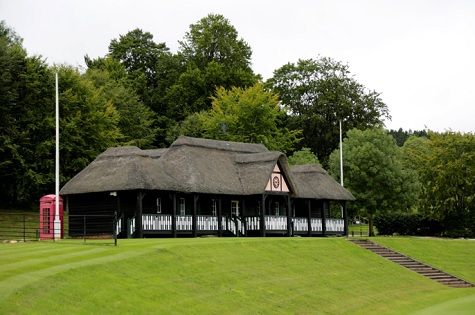
Parks webinar
Last week, I also attended several online meetings and webinars enabling me to catch up with the latest news from fellow professionals. First up was a meeting with the Midlands Parks Forum where we had the opportunity to hear a couple of presentations on the current state of playground management followed by a talk on the new planning gain programme, aptly named Biodiversity Net Gain (Natural England).
First to speak was Mark Hardy, Chair of Association of Play Industries (API).
The API is the lead trade body in the play sector. It represents the interests of manufacturers, installers, designers and distributors of both outdoor and indoor play equipment and safer surfacing. The API promotes best practice and high-quality play provision within the play industry.
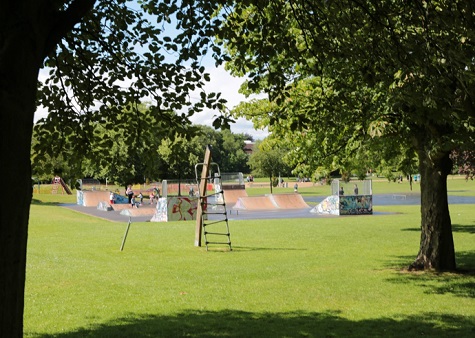
Mark was able to give answers to a number of burning questions from the attendees. He spoke about the importance on carrying out pre safety checks before opening up playgrounds to the public and making sure you have revised and carried out the relevant risk assessments on every piece of play equipment and play ground. Stating that parks managers should use the government’s latest guidelines to help implement and ensure play areas are safe and fit for use.
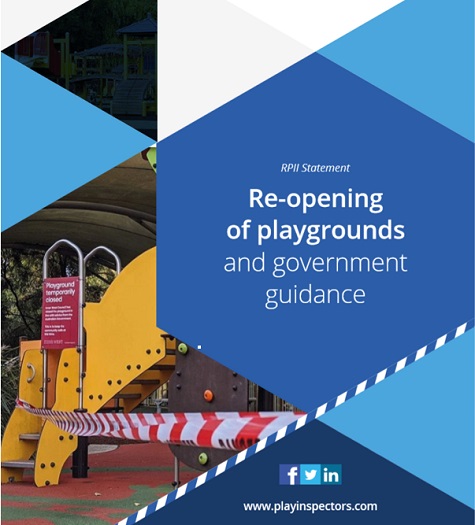
These messages were reaffirmed by Jon Dalton the director of the Play Inspection Company who provide a number of playground inspection related services including annual and post installation inspections, RPII inspector training and qualification renewals.
They also touched on importance for councils to provide clear and concise signs and notices to ensure the public are aware of their responsibilities along with the council when it comes using council run playgrounds. The emphasis should be on the importance of washing hands and using sanitiser products before and after using play equipment.
The second part of the meeting was focussed on the biodiversity net gain – planning programme.
The biodiversity net gain concept seeks measurable improvements for biodiversity by creating or enhancing habitats in association with development. Development proposals must lead to “genuine and demonstrable gains for biodiversity”, against baseline conditions, all of which are quantified using the government’s biodiversity metric.
To achieve biodiversity net gain, proposals must follow the ‘mitigation hierarchy’ which compels planning applicants to avoid harm in the first instance, then mitigate or finally compensate for losses on-site, off-site or through a combination of the two solutions. These measures will be required in planning conditions. More information can be found here.
We were given a detailed presentation from three current Biodiversity Net Gain practitioners:
- Introduction - by Dave Solly, senior adviser, green infrastructure, Natural England
- Concept and context – Policy drivers including the Environment Bill - By Dr Nick White, principal adviser, Net Gain
- Practical example – Experiences of testing on the ground – by David Lowe, team leader, Ecology, Historic Environment & Landscape, Warwickshire County Council.
It was certainly a very interesting topic with many councils now pursuing this method of net gaining within their planning departments, with parks officers taking the lead to ensure these gains are met.
Rugby Groundsmen Connected
My next meeting was taking part in a live RFU Rugby Groundsmen Connected webinar titled Feeding Your Turf that took place last Thursday evening.

This saw the RFU head groundman, Jim Buttar, talking about the decisions required by club groundmen before they apply any fertiliser to their pitches.
He spoke about the need to understand your soil and by taking physical soil samples you can evaluate your soil type and ascertain its nutrient status. Once armed with this information you can then determine the correct type of fertiliser inputs for your pitches.
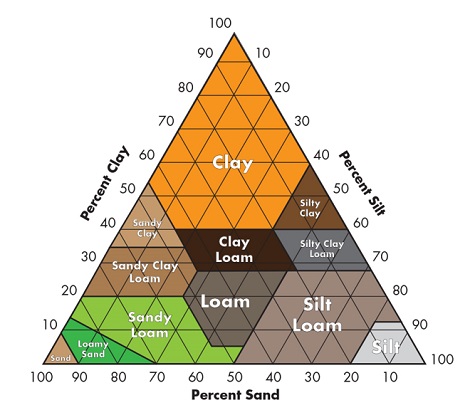
Jim went on to explain the varied fertiliser products on the market, how they work and their longevity depending on what soil you have to manage. During the meeting, several polls were conducted to ask the attendees what soils they have and what was their frequency of application and type of fertiliser they were using?
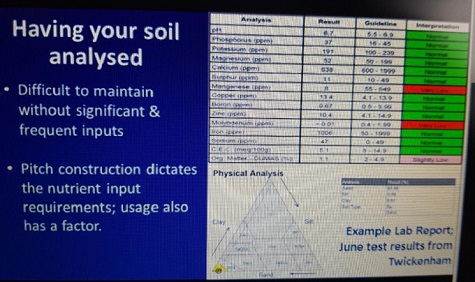
The responses were very interesting. Regarding ‘what type of soil do you have?’, 70% responded that they knew what soil they had, whereas 30% did not know.
As for what ratio of NPK fertilisers they were using, an array of different ratios and types of product types were mentioned. All in all, it was a particularly good webinar with many attendees commenting at the end of the meeting how much they enjoyed Jim’s presentation.
I can see the RFU doing many more of these in the coming months enabling the opportunity to exchange relevant information for their members.
Tough conditions
As for the latest on our industry shows, you can read today the GMA’s latest update on Saltex. Luke Perry their event show organiser admitted that show preparations are somewhat different to the usual event planning. There is still uncertainty and questions arising as to how large gatherings and exhibitions will be delivered.
I personally think that there will be certain manufacturers and companies who will be considering very carefully whether they should attend the show. For me, it is still too early to predict what the scenarios will be next March? Will companies have the spare cash to invest? Will the public be keen to attend?
I read with dismay in Friday's edition of our Service Dealer magazine the demise of one machinery dealer in Surrey. Consumer confidence is at an all time low and we will no doubt see many more companies struggling in the coming months.
It would be interesting to hear what the manufacturers have to say about attending industry shows in this difficult economic climate.